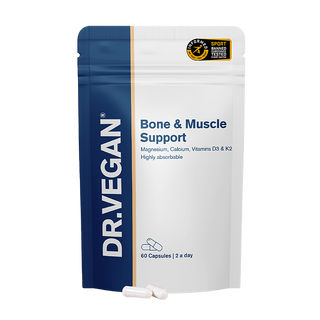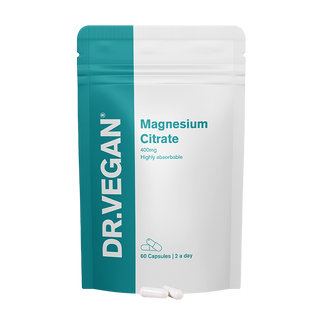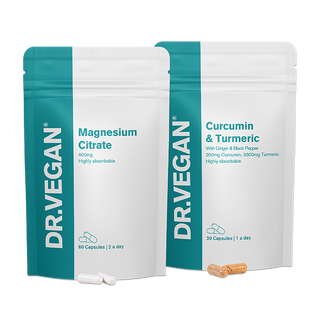How do I know if I'm deficient in Magnesium?

Magnesium is one of the most abundant minerals in the body and it is involved in hundreds of cellular reactions. While magnesium deficiency (known as hypomagnesemia) is rare, intakes of magnesium that are considered too low are common. Here are 9 potential signs your magnesium is too low.
Who is affected by low Magnesium?
Despite a range of dietary sources of magnesium, one in eight adults in the UK and half of teenage girls have low intakes of Magnesium.(1) Mild cases of hypomagnesaemia may be found in severely ill patients, alcoholics and those with malabsorption disorders.
Magnesium plays a key role in many tissues and reactions around the body and low levels of this mineral can result in a range of symptoms.
How diet can impact a magnesium deficiency
Diet plays a vital role in both how much magnesium you consume and how well your body absorbs it. Different diets, whether omnivorous, vegetarian or vegan, can influence your magnesium levels in different ways.
While no single diet is perfect, each comes with its own nutritional strengths and weaknesses. For instance, plant-based diets tend to be higher in magnesium due to their focus on whole grains, legumes, nuts and leafy greens. However, they may be lower in calcium if dairy is excluded.
In contrast, omnivorous diets often include more calcium, particularly from dairy products, but are typically lower in magnesium. This matters because calcium and magnesium compete for absorption in the body. When calcium intake is very high, especially from dairy consumed with meals, it can reduce the amount of magnesium your body absorbs. Plant-based sources of calcium, like sesame seeds or tofu, tend to be better balanced with magnesium, so this effect is less pronounced.
The key takeaway is that diets low in magnesium-rich foods or high in calcium-heavy meals may contribute to a magnesium deficiency, even if overall nutrient intake appears balanced.
Symptoms of low Magnesium
Muscle twitches and cramps
Magnesium helps muscles to relax. Low Magnesium levels can result in muscles contracting too much causing twitches or cramps.
Learn more in 'Restless Legs Syndrome: Causes and how to manage it'.
Fatigue and muscle weakness
Magnesium is important for normal muscle function and muscle weakness can be a sign of low Magnesium.
Not sleeping well
Getting adequate Magnesium can help calm both body and mind. It helps regulate neurotransmitters that send signals throughout the nervous system and brain. It also helps regulate the hormone melatonin, which helps control the sleep cycle. Magnesium could also help improve sleep quality and decrease insomnia symptoms. (2)
Learn more in How your diet can help your sleep.
Anxiety
As a result of its role in regulating neurotransmitters, a review of evidence suggests that Magnesium may have a beneficial effect on anxiety levels. That said, the quality of evidence isn’t as good as it could be so more studies are required to confirm this. (3)
Discover the best foods to boost your energy and reduce stress.
Irregular heartbeat
Magnesium plays a key role in nerve impulses and muscle contractions, and crucially it helps maintain a normal heartbeat. Low magnesium can cause an irregular heartbeat rhythm such as heart palpitations, which are pauses between heartbeats.
Low mood
Some evidence suggests that a higher dietary intake of Magnesium may be associated with lower depression symptoms, although more studies are still needed to confirm this.(4)
You might enjoy 5 foods to improve your mood.
Migraines
The cause of migraines can be due to a variety of factors such as hormones, stress, flickering lights or specific foods. One potential factor that can contribute to migraines is a low Magnesium level.
Bone & Muscle Support

High blood pressure
Evidence suggests low Magnesium levels may raise blood pressure and taking a supplement might help reduce high blood pressure.(5) Often there are no clear signs of high blood pressure and the only way to know may be to have your blood pressure tested.
Osteoporosis risk
Magnesium has been shown to increase bone mineral density and may be beneficial in preventing or managing osteoporosis(6) – a condition that weakens bones.
Osteoporosis develops over several years and often the first sign of it is when a minor fall or sudden impact causes a bone fracture. This is why Magnesium, alongside Calcium, Vitamin K and Vitamin D, is a common vitamin for bones.
Do I get Magnesium in my diet?
It can be difficult to know what nutrients your diet provides and what it doesn't, and how they support your body, so we've created a free online Virtual Nutritionist that shows you.
There are many different types of magnesium, it can be hard to know which one is best for your specific needs. Discover which type of Magnesium is right for you.
Summary
As Magnesium plays a role in many tissues all over the body, it is perhaps no surprise there are a wide range of signs that might indicate low levels, or that it is one of the most popular mineral supplements taken by men and women.
Discover our range of vegan vitamins and supplements.
Want to hear more from our nutritionists? Sign up to our email newsletter for insights and exclusive offers:
References
- NDNS (2018) Results from years 7 and 8 combined. Available: https://www.gov.uk/government/statistics/ndns-results-from-years-7-and-8-combined
- Abbasi et al (2012) Available: https://www.ncbi.nlm.nih.gov/pmc/articles/PMC3703169/
- Boyle et al (2017) Available: https://www.ncbi.nlm.nih.gov/pmc/articles/PMC5452159/
- Derom et al (2013) Available: https://pubmed.ncbi.nlm.nih.gov/23321048/
- Kass et al (2012) Available: https://pubmed.ncbi.nlm.nih.gov/22318649/
- Aydin et al (2010) Available: https://pubmed.ncbi.nlm.nih.gov/19488681/



















